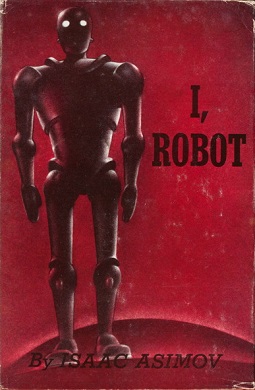
I, Robot is a fixup collection made up of science fiction short stories by American writer Isaac Asimov. The stories originally appeared in the American magazines Super Science Stories and Astounding Science Fiction between 1940 and 1950 and were then collected into a 1950 publication Gnome Press in 1950, in an initial edition of 5,000 copies.
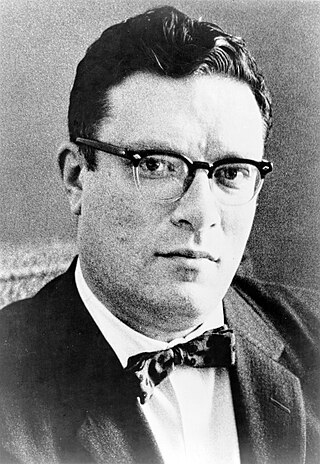
Isaac Asimov was an American writer and professor of biochemistry at Boston University. During his lifetime, Asimov was considered one of the "Big Three" science fiction writers, along with Robert A. Heinlein and Arthur C. Clarke. A prolific writer, he wrote or edited more than 500 books. He also wrote an estimated 90,000 letters and postcards. Best known for his hard science fiction, Asimov also wrote mysteries and fantasy, as well as popular science and other non-fiction.
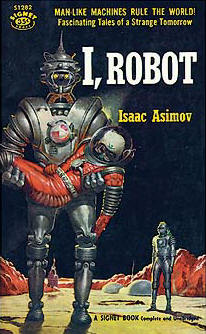
The Three Laws of Robotics are a set of rules devised by science fiction author Isaac Asimov, which were to be followed by robots in several of his stories. The rules were introduced in his 1942 short story "Runaround", although similar restrictions had been implied in earlier stories.
Thiotimoline is a fictitious chemical compound conceived by American biochemist and science fiction author Isaac Asimov. It was first described in a spoof scientific paper titled "The Endochronic Properties of Resublimated Thiotimoline" in 1948. The major peculiarity of the chemical is its "endochronicity": it starts dissolving before it makes contact with water.

Stanley Grauman Weinbaum was an American science fiction writer. His first story, "A Martian Odyssey", was published to great acclaim in July 1934; the alien Tweel was arguably the first character to satisfy John W. Campbell's challenge: "Write me a creature who thinks as well as a man, or better than a man, but not like a man." Weinbaum wrote more short stories and a few novels, but died from lung cancer less than a year and a half later.
"Robbie" is a science fiction short story by American writer Isaac Asimov. It was the first of Asimov's positronic robot stories. In 2016, "'Robbie" won a retrospective 1941 Hugo Award for best short story. "Robbie" was the fourteenth story written by Asimov, and the ninth to be published. It was the first story in Asimov's Robot series.

"The Ugly Little Boy" is a science fiction short story by American writer Isaac Asimov. The story first appeared in the September 1958 issue of Galaxy Science Fiction under the title "Lastborn", and was reprinted under its current title in the 1959 collection Nine Tomorrows. The story deals with a Homo neanderthalensis child which is brought to the future by means of time travel. Robert Silverberg later expanded it into a novel with the same title published in 1992.

"The Last Question" is a science fiction short story by American writer Isaac Asimov. It first appeared in the November 1956 issue of Science Fiction Quarterly and in the anthologies in the collections Nine Tomorrows (1959), The Best of Isaac Asimov (1973), Robot Dreams (1986), The Best Science Fiction of Isaac Asimov (1986), the retrospective Opus 100 (1969), and in Isaac Asimov: The Complete Stories, Vol. 1 (1990). While he also considered it one of his best works, "The Last Question" was Asimov's favorite short story of his own authorship, and is one of a loosely connected series of stories concerning a fictional computer called Multivac. Through successive generations, humanity questions Multivac on the subject of entropy.
"The Dead Past" is a science fiction short story by American writer Isaac Asimov, first published in the April 1956 issue of Astounding Science Fiction. It was later collected in Earth Is Room Enough (1957) and The Best of Isaac Asimov (1973), and adapted into an episode of the science-fiction television series Out of the Unknown. Its pattern is that of dystopian fiction, but of a subtly nuanced flavor.

"C-Chute" is a science fiction short story by American writer Isaac Asimov. It was first published in the October 1951 issue of Galaxy Magazine and later appeared in Asimov's collections Nightfall and Other Stories (1969) and The Best of Isaac Asimov (1973).

"The Fun They Had" is a science fiction story by American writer Isaac Asimov. It first appeared in a children's newspaper in 1951 and was reprinted in the February 1954 issue of The Magazine of Fantasy and Science Fiction, Earth Is Room Enough (1957), 50 Short Science Fiction Tales (1960), and The Best of Isaac Asimov (1973).

Buy Jupiter and Other Stories is a 1975 collection of short stories by American writer Isaac Asimov. Each story is introduced by a short account of how it came to be written and what was happening in Asimov's life at the time, and follows on from where The Early Asimov (1972) left off. In the introduction, Asimov explains that his objective is to tell enough of his autobiography in his short story collections so that his editors will stop asking him to write an actual autobiography.
Martin Harry Greenberg was an American academic and anthologist in many genres, including mysteries and horror, but especially in speculative fiction. In all, he compiled 1,298 anthologies and commissioned over 8,200 original short stories. He founded Tekno Books, a packager of more than 2000 published books. He was also a co-founder of the Sci-Fi Channel. Greenberg was also an expert in terrorism and the Middle East. He was a longtime friend, colleague and business partner of Isaac Asimov.

"The Gentle Vultures" is a science fiction short story by American writer Isaac Asimov. The story first appeared in the December 1957 issue of Super-Science Fiction, and was reprinted in the 1959 collection Nine Tomorrows.
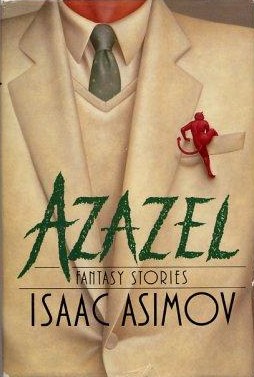
Azazel is a character created by Isaac Asimov and featured in a series of fantasy short stories. Azazel is a two-centimeter-tall demon, named after the Biblical demon.
"Unto the Fourth Generation" is a fantasy short story by Isaac Asimov. It first appeared in the April 1959 issue of The Magazine of Fantasy and Science Fiction (F&SF) and has been reprinted in the collections Nightfall and Other Stories (1969) and The Best Science Fiction of Isaac Asimov (1986). It is Asimov's most explicitly Jewish story.

"Founding Father" is a science fiction short story by American writer Isaac Asimov. It was first published in the October 1965 issue of Galaxy Science Fiction, and reprinted in the 1975 collection Buy Jupiter and Other Stories. It was inspired by a cover painting of a space-helmeted face backed by several crosses, provided by the magazine's editor, Frederik Pohl.
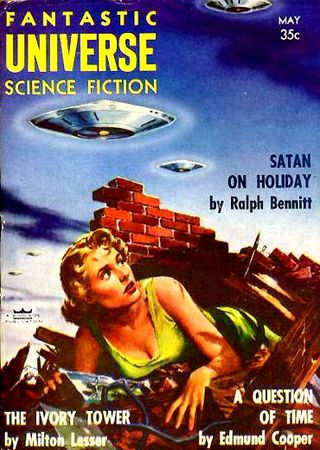
"Hell-Fire" is a science fiction short story by American writer Isaac Asimov, originally published in the May 1956 issue of Fantastic Universe and reprinted in the 1957 collection Earth Is Room Enough. It is one of a number of stories, such as "Darwinian Pool Room" and "Silly Asses", in which Asimov worries about the nuclear arms race of the 1950s.
"Deadline" is a 1944 science fiction short story by American writer Cleve Cartmill, first published in Astounding Science Fiction. The story described the then-secret atomic bomb in some detail. At that time the bomb was still under development and top secret, which prompted a visit by the FBI.
Suzanne Palmer is an American science fiction writer known for her novelette "The Secret Life of Bots", which won a Hugo Award for Best Novelette in 2018. The story also won a WSFA Small Press Award and was a finalist for the Theodore Sturgeon Award.













